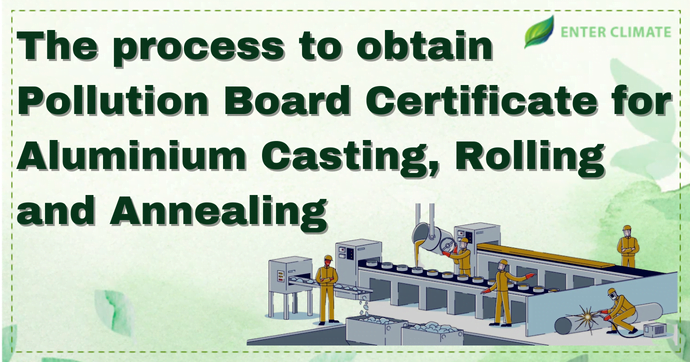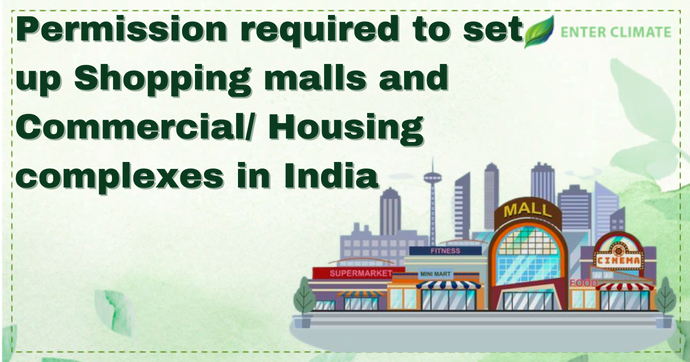The process to obtain Pollution Board Certificate for Aluminium Casting, Rolling and Annealing
 08 Dec, 2022
08 Dec, 2022 
Aluminium is a durable and strong metal that is a conductor of electricity and heat, corrosion resilient and a good reflector of light. These characteristics have made aluminium one of the most desired metals in the world today, be it in construction, automobile or electronic industries. Aluminium is one of those metals that can be castor rolled easily due to high ductility and malleability. The casting business works with wrought aluminium in the form of aluminium slabs that are melted and poured into casts. The casting process includes die casting, sand casting (green sand and dry sand), permanent mould casting, plaster casting, investment casting, and continuous casting. Other processes such as squeeze casting, lost foam and hot isostatic pressing are also used in foundries that cast aluminium. Continue reading to find out about the business of Aluminium Casting, Rolling and Annealing and the legalities involved in obtaining a Pollution Board certificate for Casting, Rolling and Annealing units.
Aluminium Rolling
Rolled aluminium is used in various products- from aluminium sheets to food and beverage packaging. The construction industry uses it to make aluminium roofing, rain gutters, siding panels, anti-skid flooring and many other building items. Aluminium rolled products are used mainly in engineering, automotive, building and many household items. A pollution Board Certificate for Aluminium casting, rolling and annealing are required for the rolling business before starting the facility. Depending on the desired properties of a particular product, the decision to heat the aluminium stock or not is taken. If heating of aluminium slabs is not required before rolling, the aluminium will be cold-worked. The roller applies force to the slab’s top and bottom until it reaches the desired thickness. As per the requirement, the aluminium slabs can be given the following shapes.
- Plates: a flat sheet that is either hot or cold rolled up to 6 mm thickness.
- Shate: it is a flat material that is hot or cold rolled and between 4 & 6 mm in thickness.
- Sheets: a flat, cold rolled material that is over 0.2mm but not exceeding 4mm in thickness.
- Foils: a cold rolled material that is 0.2mm thick or even less.
Aluminium Annealing
Aluminium annealing is a secondary process found in most aluminium mills that produce strengthened aluminium. Heat treatment is done on wrought aluminium and alloys. When applied to aluminium alloys, it increases the strength and hardness of the alloys. Equipment used in aluminium heat treatment involves the use of ovens (i.e. horizontal and drop bottom styles) and furnaces (box or pit styles).
Different types of Aluminium Casting Businesses
Die Casting Business
Approximately 85% of aluminium alloy die castings are produced in aluminium-silicon-copper alloys. This provides a good combination of cost, strength, and corrosion resistance, together with the high fluidity and freedom from hot shortness required for easy casting.
Permanent mould casting Business
Permanent mould casting is similar to die casting as they both are suited for high-volume production. The difference lies in the casting size, as these are typically larger than die castings. The maximum weight of permanent mould castings is usually about 10 kg. Permanent mould castings exhibit excellent mechanical strength, fluidity, and resistance to hot tearing.
Sand mould casting business
This kind of casting involves forming a casting mould with sand, including conventional sand casting and evaporative pattern casting.
Licences and Documents required to start Aluminium casting, rolling and annealing business
Company/ Firm Registration: The investor has to register his/ her company/ firm as per prevailing acts. Documents required are
- Company Details (e.g. Name, Class, Category, IFSC details, etc.)
- Memorandum of Association
- Article of Association
- Affidavit and declaration by first Subscribers and Directors
(For Firm Registration)
- Partnership Deed
- Photo of Head
- ID Proof
- Address Proof
Consent Certificate for Aluminium Casting, Rolling and Annealing Units
Also known as pollution NOC, this certificate is issued under the Under Water & Air Act. The process to obtain Pollution Board Certificate for Aluminium Casting, Rolling and Annealing is as follows.
Consent to Establish: Aluminium processing units are categorised under the Red categories list that CPCB maintains. The process to obtain a Pollution Board Certificate for Aluminium Casting, Rolling and Annealing will involve the unit applying for CTE in the industry category it belongs to.
|
Document and Fee submission for CTE NOC The applicant will submit a complete application form and the required documents and fee to obtain the CTE. The application is forwarded to the approving authority after submission of the application on the OCMMS portal of the concerned SPCB/PCC. |
Document Scrutiny and Site inspection by the Authorities The Section officer will scrutinise the application and make recommendations. A final decision is usually taken within 30 days.No site inspection is required to deal with the cases of CTE unless any violation comes to the notice of the Board and the unit submits self-certification. |
Issuance of CTE NOC Based on the recommendation, CTE will be granted. For all Projects, CTE can be issueddepending on the SPCB. The chairman will be the Certificate issuing authority, and the process can take 120 days. |
Documents required to obtain CTE for Aluminium Casting, Rolling and Annealing
- An application under Air Act/Water Act/ Hazardous Waste Rules
- Site Location Address with Survey/Plot/Khasra No/ Pin
- Registered Office Address
- Investment in plant /machinery
- Plant Commissioning or Production Date
- Premises Area
- Waste Water Generation Kilo litre/Day (and its disposal mode, Discharge Point)
- Emission Type and the air pollution control measures
- Other Details like ETP / STP Membership, Bore Wells/D.G. Sets, Tube Wells/Boilers etc.)
- Solid Waste generation details
- DIC / DGTD/ SIA / Mining lease / Conceptual Plan etc.
- Land allotment letter/ LOI
- Satellite imagery project/industry/ industry site
- Layout plan of the project
- Project report including complete details of the manufacturing process with material balance/raw material
- Investment proof CA /annual report /CS certificate/ Self Certificate
- NOC of Gram Sabha / local body
- Proof of installation of Effluent/Sewage Treatment Plant
- Technical Report and drawing of ETP/STP and Air Pollution Control Arrangements
- Permission of CGWA (If applicable)
- Water cess returns (if applicable)
- Compliance with Environment clearance conditions (If applicable)
Consent to operate
This is a post-establishment certificate under Water Act 1974 and Air Act 1981[1]. The consent to operate will be issued after submitting the documents mentioned in the online application form. The procedure for obtaining consent to operate for aluminium casting, rolling and annealing business is explained below.
|
Document and Fee submission for CTO NOC The CTO application, complete in all respect, must be submitted at least 30 days prior to the commencement of the operation. The validity period of consent to operate will be restricted according to the number of years of fees submitted by the applicant. |
Document Scrutiny and inspection by the Authorities The concerned section officer will scrutinise all submitted documents and verify if all conditions in the CTE have been complied with. A scheduled site inspection by the Inspection Officer will follow this. |
Issuance of CTO NOC Based on the recommendations and the inspection report, the CTO will be granted/rejected by the Chairman / Member Secretary as per the delegation of powers in the SPCB. |
The documents required to obtain CTO for Aluminium Casting, Rolling and Annealing
- Trade License
- Factory License(under Factories Act, 1948) from the Labour Department
- Applicant details (Name, contact details, address etc.)
- Manufacturing Process details
- Worker details
- Details of Machines like lifts, lifting machines, etc.
- Escape route of dangerous gases/fumes
- Materials used for production and construction
- Brief description of the process along with a list of raw materials with quantity to be used in the manufacturing process
Additional Licences Required by Aluminium Casting, rolling and annealing business
- Professional Tax Registration
- GST Registration
- Approval for new electricity connection
- Water Connection/ GGWA NOC
- Approval of Factory Plan/ Layout from the labour Department
- Hazardous waste Authorisation/ Agreement with TSDF to dispose of waste.
Conclusion
Aluminium rolling is one of the most widely used processing of aluminium, with domestic demand for flat-rolled products expected to increase substantially. With so many applications for aluminium products, from food wrapping to aircraft manufacturing, the scope of aluminium processing businesses is immense. However, it should be noted that several factors decide the profitability of this business, like transportation cost, availability of coal energy consumption etc. Entrepreneurs who want to tap into this opportunity must obtain Pollution Control Board Certificate for the aluminium casting, rolling and annealing business.
Read our Article: The Process To Obtain A PCB Certificate For Asbestos Products Manufacturing












